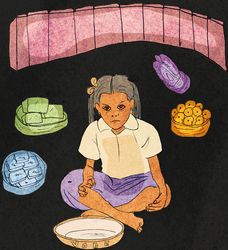It is raining freebies in Karnataka. The Congress is promising 10 kilos of rice or wheat every month to the poor, 200 units of power, Rs2,000 to every female family head, Rs1,500 to every jobless diploma holder, and Rs3,000 to every jobless graduate.
The BJP, initially sceptical of freebies which Narendra Modi has been scoffing at as revdis, has followed suit. In return for another chance at government with or without Basavaraj Bommai, the party is offering every poor household half a litre of Nandini (mind you, no Amul) milk every day, 5 kilos of rice and millets every month, and three cylinders of gas a year to boil the milk and cook the grain.
True to Modi style, the BJP has given a rhyming touch to their package. All their free offers and subsidies have been packed into seven As—anna (food), akshara (education), aarogya (health), abhivruddhi (prosperity), aadaya (profit), and abhaya (shelter).
The Congress package looks clumsy. They have stuffed most goodies into two G-packages (not to be confused with 2G). They call their free power scheme grha jyoti (bright home) and schemes for women as grha lakshmi (prosperous home). The rest are spilling over from the grha bundles.
Therein lies the difference. The BJP knows how to package and label things neat and smart, even old milk in new bottles with new labels—Nirmal Bharat as Swachh Bharat, Look East as Act East, self-reliance as atmanirbhar, and so on. The Congress, on the other hand, find themselves carrying a lot of their own and others’ old baggage, with several unwanted stuff spilling out.
Let’s leave packaging and labelling to the party managers. The point is that, the Kannadigas “have never had it so good”. Whoever comes to power, they will have free bus rides, free rations, and more.
The well-heeled scoff at freebies as revdis, a kind of native candy made of sesame seeds or peanut coated in melted gur, and popular in north India. Native wisdom tells you that revdis keep your body warm, and so are better eaten in winter. Old socialist George Fernandes used to keep them in bowls in his Delhi home, and offer them to guests in winters along with warm tea served in mud tumblers called kullads.
Indeed, revdi and kullad have a native and socialist touch about them. Socialism is no longer a virtue, and revdi has come to acquire a bad meaning in aspirational India as crumbs or freebies. The Supreme Court is looking into a petition seeking a ban on them, but even the Election Commission doesn’t know where to draw the line between a welfare measure and a freebie.
The truth is: What is revdi to A may be manna to B. MGR’s mid-day meals were denounced as freebies in the 1980s, but they boosted school enrolment and child health standards, and have since been copied by most states. Free bicycles, which the Samajwadis gave to teenagers in UP two polls ago, looked freebies to many, but they enabled thousands of girls to go to school. Free laptops enabled poor kids to cross the digital divide during the lockdown. Arvind Kejriwal’s free bus rides for women have enabled housemaids, charwomen, sweepers, hawkers, ayahs and shop hands to move around Delhi, improving labour availability.
It also depends on which world you inhabit. No one called it revdi when Luxembourg made bus, tram and train travel free two years ago, or Malta did last October. Soon Germany may. One may say, Luxembourg, Malta and Germany are rich; they can give their people free rides; we, though the world’s fifth richest, have millions in penury.
True. Isn’t it all the more reason to offer free rides and meals?
prasannan@theweek.in


